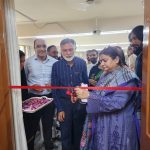As someone deeply associated with libraries and their evolving role in education, I often reflect on how we define the purpose of a library, especially in specialized settings like medical colleges and hospitals. While it is obvious that a medical library must prioritize textbooks, journals, and clinical resources, I strongly believe we must not overlook the value of general books, those that speak to culture, literature, history, poetry, art, philosophy, and even fiction.
This may sound unconventional to some, but I firmly hold the view that including a general book collection in a medical library is not just beneficial, it is essential. Because doctors and students are humans first.
Medical students and professionals spend countless hours with technical texts, case studies, and scientific data. Their minds are trained to diagnose, calculate, and respond with precision. Yet, at the heart of medicine lies something much deeper than science it’s about human connection. It’s about understanding pain, resilience, mortality, and the social context of illness.
For that, I believe general books are unmatched. A well-written novel or a simple poem can offer an emotional experience that no textbook can replicate. It allows a medical student to not just study the anatomy of a body but to feel the weight of suffering, love, or loneliness. Literature builds empathy. Art opens imagination. History gives context. These are not just abstract qualities, they are vital for any caregiver.
Holistic Development Deserves Space
When I picture the ideal medical professional, I don’t just imagine someone who is clinically sharp. I imagine someone who is well-rounded, thoughtful, reflective, and compassionate. And that kind of personality is nurtured not just by facts, but by stories, ideas, and reflections.
That’s why I strongly advocate for the inclusion of:
- Biographies of inspiring personalities.
- Novels exploring human struggle and triumph.
- Books on culture and society.
- Collections of poetry that soothe the restless mind.
- Art and philosophy books that expand vision.
These are not distractions; they are extensions of learning, vital to shaping a well-informed and balanced professional life.
Mental Health and Emotional Anchoring
I have personally observed how demanding the medical academic journey is. Stress, burnout, and emotional exhaustion are common, yet rarely addressed. In such an environment, access to general reading materials can offer subtle but powerful emotional relief. A few pages of a motivational memoir or a piece of spiritual writing can provide comfort when medical challenges become overwhelming.
To me, reading isn’t always academic, it’s also healing. And when students have easy access to diverse reading material, the library transforms from a place of pressure into a space of peace and personal growth.
Reviving the Joy of Reading
There’s another dimension to this discussion that I hold close to my heart: the fading joy of reading for pleasure. Most students today read only what is prescribed. Reading for leisure or curiosity is becoming rare in professional colleges.
By introducing books that go beyond the curriculum, we can reintroduce young minds to the beauty of reading itself not for marks, but for meaning. I envision a space where a student can study pathology and later relax with a novel, where reading is not always a race but sometimes a retreat.
Understanding Society through Stories
I believe that general books also help us understand the broader social and cultural aspects of healthcare. How do people perceive illness? What are the cultural taboos around death, disability, or mental health? These questions are rarely answered by textbooksbut can be beautifully explored through literature, history, or social commentary.
Reading about global cultures, ancient medicine, war, gender struggles, or philosophical thought gives medical professionals a wider lens through which to see their patientsnot just as cases, but as individuals with layered stories.
A Personal Vision for Medical Libraries
A medical library should not only support academic excellence it should support the formation of character. It should be a sanctuary for knowledge, but also a space for self-discovery.
If we truly want to prepare our medical students for real-world challenges, we need to ensure they are not just clinically trained, but also emotionally awake, socially aware, and culturally sensitive. A well-curated general book section can silently but significantly contribute to this goal.
Final Thought
To some, keeping novels, poetry, and history books in a medical library may appear out of place. But I believe that’s exactly where they belong, in the very heart of science. Because behind every disease is a story, behind every patient a human journey, and behind every white coat, a soul in search of meaning.
And sometimes, the best medicine is found not in a prescription, but in a poem.
(Author is a Library Futurist and from kulgam and can be reached at: [email protected])








